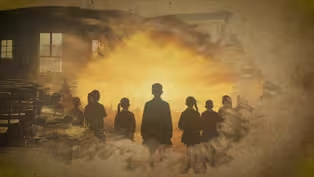
Dolores Huerta and the United Farm Workers
Clip: Episode 3 | 2m 57sVideo has Closed Captions
John Leguizamo sits down with labor leader Dolores Huerta.
Historian Paul Ortiz calls the rise of the United Farm Workers “the single most important event in Latinx history.” John Leguizamo meets Dolores Huerta, who formed the National Farm Workers Association (NFWA) with César Chávez in 1965, and hears firsthand about their struggles – and victories – in fighting for the rights of farmworkers.
Problems playing video? | Closed Captioning Feedback
Problems playing video? | Closed Captioning Feedback
Funding for American Historia is provided, in part, by PBS, the Corporation for Public Broadcasting, the Anderson Family Charitable Fund, Sue and Edgar Wachenheim III, The WNET Group’s Chasing the Dream initiative, the Ford Foundation/JustFilms, and Seton J. Melvin.

Dolores Huerta and the United Farm Workers
Clip: Episode 3 | 2m 57sVideo has Closed Captions
Historian Paul Ortiz calls the rise of the United Farm Workers “the single most important event in Latinx history.” John Leguizamo meets Dolores Huerta, who formed the National Farm Workers Association (NFWA) with César Chávez in 1965, and hears firsthand about their struggles – and victories – in fighting for the rights of farmworkers.
Problems playing video? | Closed Captioning Feedback
How to Watch VOCES American Historia: The Untold History of Latinos
VOCES American Historia: The Untold History of Latinos is available to stream on pbs.org and the free PBS App, available on iPhone, Apple TV, Android TV, Android smartphones, Amazon Fire TV, Amazon Fire Tablet, Roku, Samsung Smart TV, and Vizio.
Buy Now

Making American Historia
Ben DeJesus, director of “American Historia,” and John Leguizamo, creator and host, discuss working with historical advisors and how AI technology supported their storytelling initiatives.Providing Support for PBS.org
Learn Moreabout PBS online sponsorship♪ We shall not, we shall not be moved ♪ ♪ Just like a tree that's planted by the water... ♪ The rise of the United Farm Workers is the single most important event in Latinx history.
Come on out, brothers.
We are waiting for you!
Dolores Huerta is central to the rise of the farmworker movement.
Because remember, there have been generations of agricultural workers -- African, Latinos, Asian, etc., etc.
-- who had tried to organize and were defeated time and time again.
[Leguizamo:] I'm out here in Southern California to meet with labor leader and activist Dolores Huerta.
As a young girl, you were experiencing segregation, discrimination.
Can you describe what that was like?
- Well, I think it was mostly, uh, the kind of discrimination that you felt from your teachers, and from police, where they were always harassing us, even though we weren't doing anything wrong, you know?
And it was constant.
One of my girlfriends wanted to be a nurse.
And they told her, No, you can't be a nurse.
You have to study domestic work, how to clean houses.
When Dolores was in school, she was a very devoted student.
And she had this one favorite teacher who broke her heart.
Because one day she said to her, "I don't believe you wrote this essay.
"It's too well-written."
By the time I graduated from high school, most of my Black and Brown friends -- and Filipinos -- they had dropped out, not finishing high school.
- But we call it pushout... - Mm.
... yeah, because they have an unwelcome climate, the way that you're treated in a school that -- that kids don't feel welcome.
And I had this anger inside of me, but I never knew what to do with it until I learned how to organize.
[Leguizamo:] So when you became an activist, did you have role models?
How did you figure out how to become such a great organizer?
I think once I learned that you can get people together and that you could put pressure on the politicians, you know -- be it city council, or school board members -- and that you could register people to vote, get them to vote and elect good people to- to office, then that was real power.
[Leguizamo:] In 1965, Cesar Chavez left the Community Service Organization, and with Dolores Huerta formed the United Farm Workers Association.
They united with the Filipino grape pickers, who were also on strike for better pay and working conditions.
In solidarity, they not only refused to pick the grapes, but they also boycotted the purchase of the grapes in stores and markets all over the country.
[Huerta:] With the strike and with the boycott, we were trying to get farmworkers basic human rights: toilets in the field.
Cold drinking water.
Handwashing facilities.
Rest periods.
The right to have a union.
And also unemployment insurance, which farmworkers did not have.
Just basic human rights.
The Fight for Equal Schooling in Mendez v. Westminster
Video has Closed Captions
Clip: Ep3 | 3m 23s | The 1947 Mendez v. Westminster case was crucial in ending school segregation. (3m 23s)
Providing Support for PBS.org
Learn Moreabout PBS online sponsorshipSupport for PBS provided by:
Funding for American Historia is provided, in part, by PBS, the Corporation for Public Broadcasting, the Anderson Family Charitable Fund, Sue and Edgar Wachenheim III, The WNET Group’s Chasing the Dream initiative, the Ford Foundation/JustFilms, and Seton J. Melvin.
















